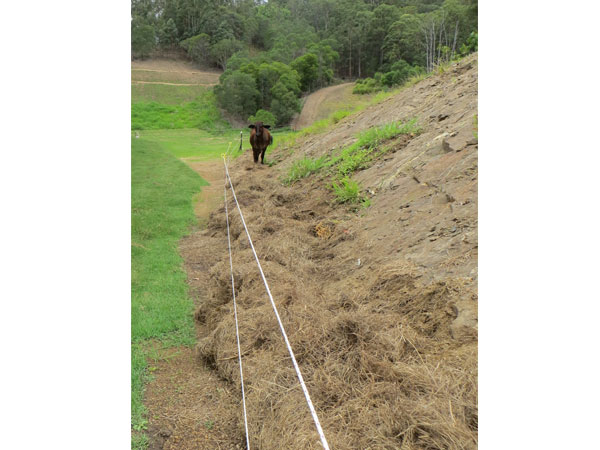Farming for a lifestyle
By Linda Murray
Grazing management for improved productivity and profitability forms part of the soil management cycle.
Whether using grazing animals for profit, or as a “lifestyle/hobby block” dream, good grazing and pasture management can generate unseen profits in the soil.
Today, there is a widening disconnect between lifestyle/hobby type landowners and those farming for a profit. Many lifestyle owners are armed with knowledge and practical experience, looking to improve their land through earth-friendly means. Unfortunately, there are just as many who have very little knowledge.
With fewer landowners coming from farming backgrounds, major soil problems such as erosion are appearing through a lack of basic knowledge of stocking rates, grass growing cycles, and the importance of soil’s role.

Cattle being successfully used to pack old grassy hay.
These landowners generally have a lack of understanding of the seriousness of their erosion issue and often assume that by paying for a solution, complete restoration can happen in months!
Another common issue involves the overuse of herbicides and pesticides, the most common being glyphosate (Roundup). Glyphosate is commonly used at much higher rates than recommended, or even applied at 100 percent strength.
Don M. Huber, emeritus professor of plant pathology at Purdue University USA, was recently in Australia for the World Wide Agricultural Conference. Don gave presentations on Managing Nutrition to Control Plant Disease. Part of his scientific research shows that glyphosate:
– Accumulate in roots and reproductive tissues of plants
– Chelate micronutrients when applied as a foliar spray
– Is capable of accumulating in the soil
– Reduces nutrient uptake by plants
– Compromises plant disease resistance
– Is toxic to beneficial organisms in the soil such as:
– N-fixing microbes
– Mycorrhizae
– Biological control organisms
– Earthworms
– Plant growth promoting rhizobacteria
Also discussed were the effects of glyphosate toxicity and impacts on animal health, including fertility and intestinal inflammation issues.
Herbicides and pesticides impact on the ability of the soil to grow healthy plants. In turn, this reflects on stocking capacity rates.
Good grazing management depends on managing pastures and stocking rates according to weather, as well as managing use of pesticides, herbicides and artificial fertilizers. Increasingly, case studies detail increased crop and pasture quality and quantity, alongside decreased/nil crop and animal disease when returning to nutrition and biological farming practices.
“Undernourishment of the soil is at the root of all weaknesses and defects in health of any plant, animal or human” Sir Albert Howard, 1940.
Contact Linda Murray at [email protected]



